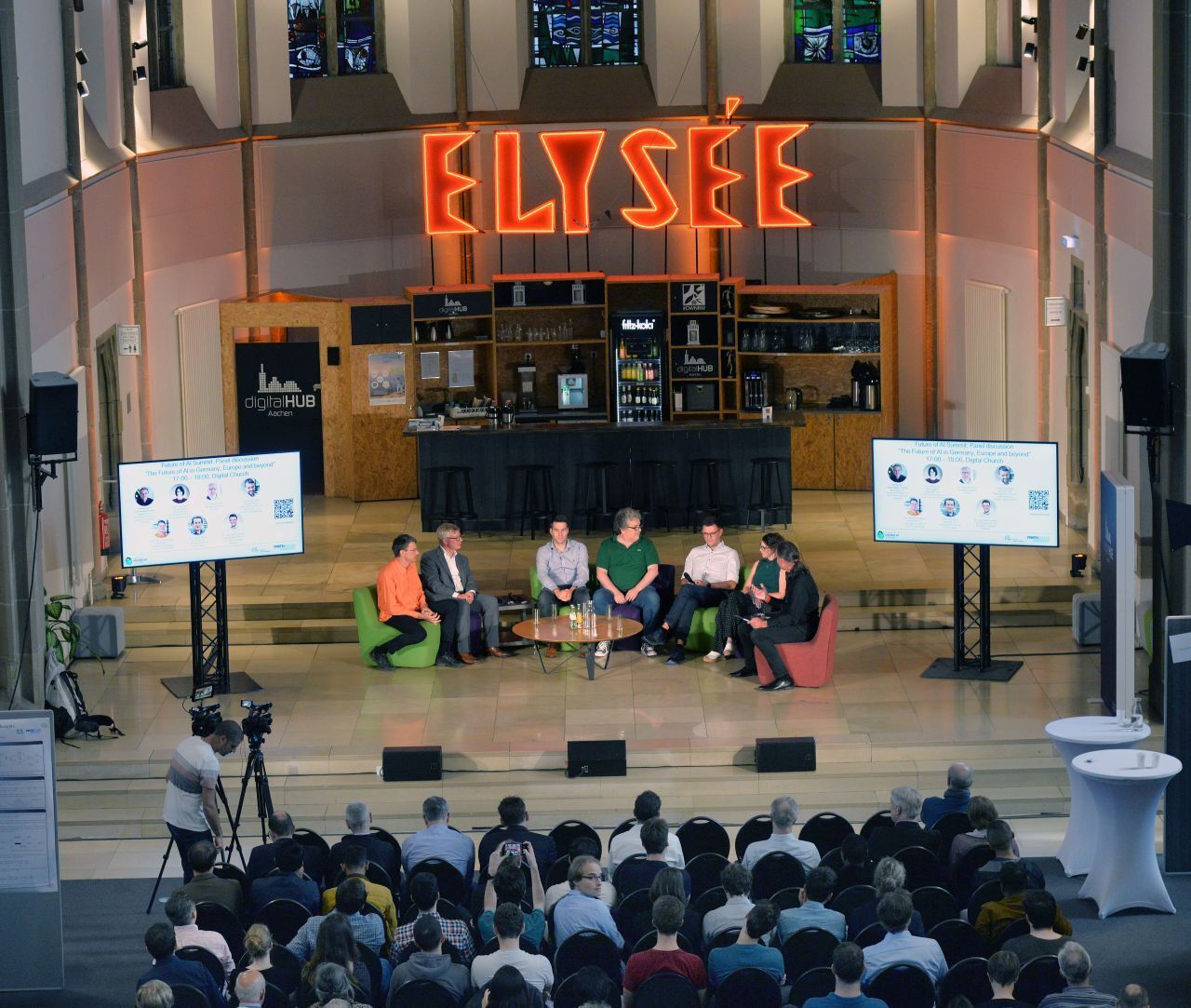AI: Strong signal to the federal government
Outstanding scientists have addressed seven recommendations to the Federal Government.

At the summit meeting of Humboldt Professors in the field of AI last week in Aachen, the top researchers elaborated recommendations on artificial intelligence. The Karlsruhe Institute of Technology (KIT) was represented by Humboldt Professor André Platzer.
The Alexander von Humboldt Professorship, Germany's most highly endowed international research award, is endowed with up to five million euros each. With this award, the Alexander von Humboldt Foundation honors world-leading researchers from all disciplines who have previously worked abroad. The aim is for them to carry out pioneering research at German universities in the long term. The award money is intended for the first five years of research in Germany. The award is funded by the Federal Ministry of Education and Research. The Humboldt Professorship gives German universities the opportunity to attract top international researchers and to strengthen their own profile in the face of global competition. The award is linked to the obligation to offer the new Humboldt Professors a long-term perspective for their research in Germany. The Alexander von Humboldt Professorships for Artificial Intelligence are an essential component of the AI strategy of Federal Republic of Germany.
Seven recommendations on artificial intelligence (AI) to the Government of Germany.
The following recommendations were developed during "Future of AI" summit of Alexander von Humboldt Professors in the field of AI, which took place on 27 and 28 September 2023 in Aachen, under the auspices of the Alexander von Humboldt Foundation, and were unanimously approved by the professors present.
- For funding, assure a broad view of what constitutes AI research, including related non-technical disciplines (e.g., cognitive science, natural sciences, social science, ethics).
- Work towards technological independence in AI, which is crucial for our economy and society. This will require very substantial investment. National and EU spending on AI should be commensurate with the investments made in the US and China.
- Fund serious and dedicated AI computing and data centres as an area for leading the way for sustainable innovation. Expansion of existing high-performance computing infrastructure is not a viable solution, since requirements on structure and operation are markedly different.
- Continue the funding of AvH Professorships in AI (ensuring that a more diverse set of candidates, esp. non-Germans, are proposed and do accept).
- Funding of ERC research grants. On EU level, there are AI-related ERC grant applications that have been evaluated as worthy of funding (“above the threshold"), but that do not receive funding due to limited budget. We propose to fund these nationally, without any additional bureaucracy, on condition that the money is spent at a German research organisation (similar to AvH).
- Create structures to ensure that the government’s actions and strategies are informed by a more diverse set of researchers from the AI community (task force, standing committee, newly constituted structure, advisory board). This should be at a high level of government (Minister or Staatssekretär) to be effective and sufficiently responsive.
- Leverage AvH AI Professors for advice (e.g. on how to structure AI funding efficiently and effectively). These group of top scientists brings internationally leading expertise to the table, as well as extensive international experience. We are happy to help!
These 19 scientists have written and support the recommendations:
Prof. Dr. Wil van der Aalst (Alexander von Humboldt-Professor für Prozess- und Datenwissenschaft, RWTH Aachen), Prof. Dr. Oliver Brock (Alexander von Humboldt-Professor für Robotik, Technische Universität Berlin), Prof. Dr. Samarjit Chakraborty (Alexander von Humboldt-Professor für Sustainable Computing (designiert), Universität Passau), Prof. Dr. Peter Dayan (Alexander von Humboldt-Professor für Künstliche Intelligenz und Neurowissenschaft, Universität Tübingen und Max-Planck-Institut für Biologische Kybernetik), Prof. Dr. Hector Geffner (Alexander von Humboldt-Professor für Grundlagen des Maschinelles Lernen und der Deduktion, RWTH Aachen), Prof. Dr. Holger Hoos (Alexander von Humboldt-Professor für Methodik der Künstlichen Intelligenz, RWTH Aachen), Prof. Dr. Stefanie Jegelka (Alexander von Humboldt-Professor für Künstliche Intelligenz, Technische Universität München), Prof. Dr. Yaochu Jin (Alexander von Humboldt-Professor für Natur-inspirierte Künstliche Intelligenz, Universität Bielefeld), Prof. Dr. Vincent C. Müller (Alexander von Humboldt-Professor für Theorie und Ethik der Künstlichen Intelligenz, Friedrich-Alexander Universität Erlangen-Nürnberg), Prof. Dr. Sayan Mukherjee (Alexander von Humboldt-Professor für Künstliche Intelligenz, Universität Leipzig und Max-Planck-Institut für Mathematik in den Naturwissenschaften), Prof. Dr. André Platzer (Alexander von Humboldt-Professor für Logik Autonomer Dynamischer Systeme, Karlsruher Institut für Technologie), Prof. Dr. Marcus Rohrbach (Alexander von Humboldt-Professor für Multimodale Zuverlässige Künstliche Intelligenz, Technische Universität Darmstadt), Prof. Dr. Daniel Rückert (Alexander von Humboldt-Professor für Künstliche Intelligenz in der Medizin, Technische Universität München), Prof. Dr. Angela Schoellig (Alexander von Humboldt-Professor für Robotik und Künstliche Intelligenz, Technische Universität München), Prof. Dr. Suvrit Sra (Alexander von Humboldt-Professor für Künstliche Intelligenz, Technische Universität München), Prof. Dr. Radu Timofte (Alexander von Humboldt-Professor für Künstliche Intelligenz und Computer Vision, Julius-Maximilians-Universität Würzburg), Prof. Dr. Heike Vallery (Alexander von Humboldt-Professor für Künstliche Intelligenz in der Regelungstechnik, RWTH Aachen), Prof. Dr. Ingmar Weber (Alexander von Humboldt-Professor für Künstliche Intelligenz und Societal Computing, Universität des Saarlandes), Prof. Dr. Aimee van Wynsberghe (Alexander von Humboldt-Professor für Angewandte Ethik der Künstlichen Intelligenz, Rheinische Friedrich-Wilhelms-Universität Bonn), Prof. Dr. Angela Yu (Alexander von Humboldt-Professor für Computerbasierte und Kognitive Neurowissenschaften, Technische Universität Darmstadt).
